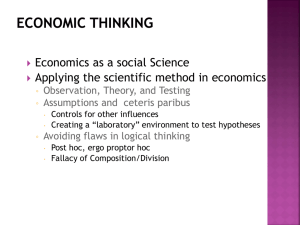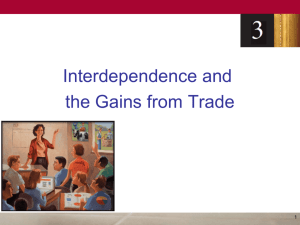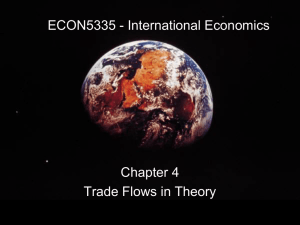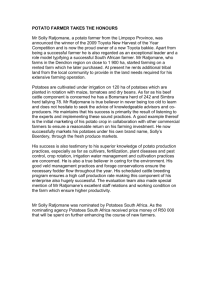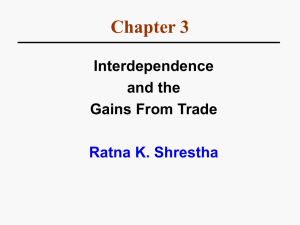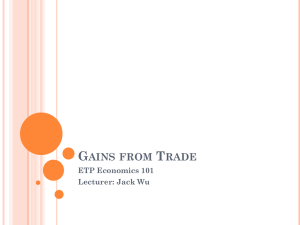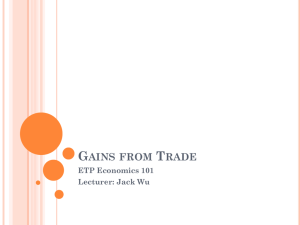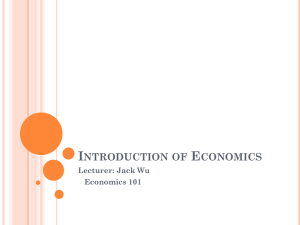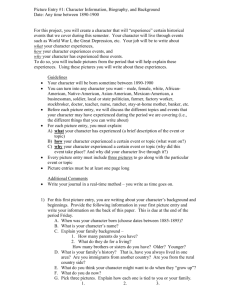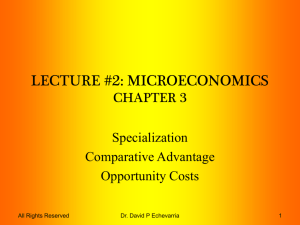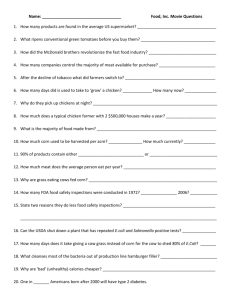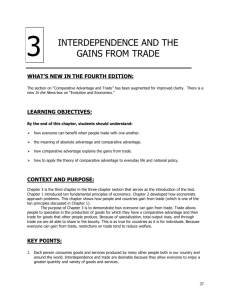Gains from Trade
advertisement
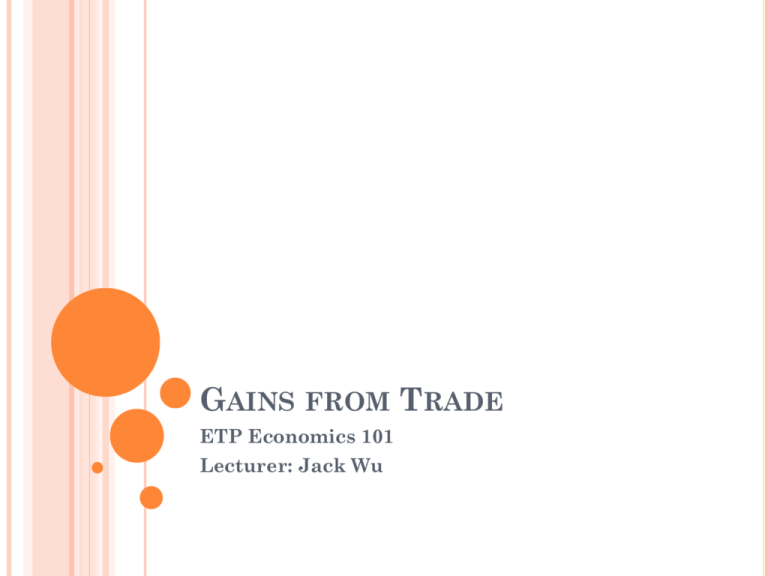
GAINS FROM TRADE ETP Economics 101 Lecturer: Jack Wu AUTARKY (自給自足)OR TRADE? How do we satisfy our wants and needs in a global economy? We can be economically self-sufficient (Autarky). We can specialize and trade with others, leading to economic interdependence. CASE 1: THE SIMPLEST ECONOMY only two goods: potatoes and meat only two people: a potato farmer and a cattle rancher Each only works 8 hours/day What should each produce? Why should they trade? CASE 1 (CONTINUED) Minutes needed to make 1 ounce of ___________________________________ Meat Potatoes ___________________________________ Farmer 60min/oz 15min/oz Rancher 20min/oz 10min/oz CASE 1 (CONTINUED) Amounts produced in 8 hours ___________________________________ Meat Potatoes ___________________________________ Farmer 8 oz 32 oz Rancher 24 oz 48 oz THE FARMER’S PRODUCTION POSSIBILITIES FRONTIER (a) The Farmer ’s Production Possibilities Frontier Meat (ounces) 8 0 32 Potatoes (ounces) THE RANCHER’S PRODUCTION POSSIBILITIES FRONTIER (b) The Rancher ’s Production Possibilities Frontier Meat (ounces) 24 0 48 Potatoes (ounces) OPPORTUNITY COST Definition Whatever must be given up to obtain some item Measures the trade-off between the two goods that each producer faces CASE 1(CONTINUED): OPPORTUNITY COSTS 1oz of meat 1oz of potatoes Farmer 4 oz of potatoes ¼ oz of meat Rancher 2 oz of potatoes ½ oz of meat ABSOLUTE ADVANTAGE The comparison among producers of a good according to their productivity—absolute advantage Describes the productivity of one person, firm, or nation compared to that of another. The producer that requires a smaller quantity of inputs to produce a good is said to have an absolute advantage in producing that good. COMPARATIVE ADVANTAGE Compares producers of a good according to their opportunity cost. Whatever must be given up to obtain some item The producer who has the smaller opportunity cost of producing a good is said to have a comparative advantage in producing that good. QUICK QUIZ 1 FROM CASE 1 Who has the absolute advantage? The farmer or the rancher? Who has the comparative advantage? The farmer or the rancher? SPECIALIZATION AND TRADE Comparative advantage and differences in opportunity costs are the basis for specialized production and trade. QUICK QUIZ 2 FROM CASE 1 What should farmer produce (or specialize in)? What should rancher produce (or specialize in)? BENEFITS OF TRADE Whenever potential trading parties have differences in opportunity costs, they can each benefit from trade. Benefits of Trade Trade can benefit everyone in a society because it allows people to specialize in activities in which they have a comparative advantage. SELF-SUFFICIENCY (AUTARKY) By ignoring each other: Each consumes what they each produce. The production possibilities frontier is also the consumption possibilities frontier. Without trade, economic gains are diminished. SELF-SUFFICIENCY (AUTARKY) IN CASE 1 Assume: Farmer spends 4 hours on meat and 4 hours on potatoes. Rancher spends 4 hours on meat and 4 hours on potatoes. CASE 1 (CONTINUED): WITHOUT TRADE Production: Farmer produces 4 oz of meat and 16 oz of potatoes. Rancher produces 12 oz of meat and 24 oz of potatoes. Consumption: Farmer consumes 4 oz of meat and 16 oz of potatoes. Rancher consumes 12 oz of meat and 24 oz of potatoes. THE FARMER’S PRODUCTION AND CONSUMPTION WITHOUT TRADE (a) The Farmer’s Production and Consumption Meat (ounces) Farmer's production and consumption without trade 8 4 A 0 32 Potatoes (ounces) 16 Copyright©2003 Southwestern/Thomson Learning THE RANCHER’S PRODUCTION AND CONSUMPTION WITHOUT TRADE (b) The Rancher’s Production and Consumption Meat (ounces) 24 B 12 0 24 Rancher's production and consumption without trade 48 Potatoes (ounces) Copyright © 2004 South-Western ONE PROPOSAL FOR SPECIALIZATION Farmer devotes all his time to growing potatoes. Rancher spends 6 hours a day raising cattle and 2 hours growing potatoes. PRODUCTION UNDER THIS PROPOSAL Farmer’s production with Specialization: 0 oz of meat and 32 oz of potatoes Rancher’s production with Specialization: 18 oz of meat and 12 oz of potatoes. PROPOSAL FOR TRADE The price of trade Must lie between the two opportunity costs Trade deal: Farmer gives rancher 15 oz of potatoes, and rancher gives farmer 5 oz of meat in return. Note: Trade Price of Meat: 2~4 oz of potatoes Note: Trade Price of Potatoes: 1/4 oz ~1/2 oz of meat CONSUMPTION WITH TRADE Farmer’s consumption with trade: 5 oz of meat and 17 oz of potatoes Rancher’s consumption with trade: 13 oz of meat and 27 oz of potatoes. HOW TRADE EXPANDS THE FARMER’S SET OF CONSUMPTION OPPORTUNITIES (a) The Farmer’s Production and Consumption Meat (ounces) 8 Farmer's consumption with trade A* 5 4 Farmer's production and consumption without trade A Farmer's production with trade 0 32 16 17 Potatoes (ounces) HOW TRADE EXPANDS THE RANCHER’S SET OF CONSUMPTION OPPORTUNITIES (b) The Rancher’s Production and Consumption Meat (ounces) Rancher's production with trade 24 Rancher's consumption with trade 18 13 B* B 12 0 12 24 27 Rancher's production and consumption without trade 48 Potatoes (ounces) INTERNATIONAL TRADE Each country has many citizens with different interests. International trade can make some individuals worse off, even as it makes the country as a whole better off. Imports—goods produced abroad and sold domestically Exports—goods produced domestically and sold abroad QUICK QUIZ 3 Martha and Stewart each spend 8 hours a day wallpapering and painting: Martha Stewart Hours needed to Do 1 Room Paint Wallpaper 2 hours/room 8 hours/room 4 hours/room 10 hours/room QUESTIONS Draw production possibility frontiers for both Martha and Stewart. (Painting on horizontal axis and Wallpaper on vertical axis) Find out the opportunity costs. Who has an absolute advantage in painting? Wallpapering? Why? Who has a comparative advantage in painting? Wallpapering? Why? If both trade works with each other, who will trade away painting in exchange for wallpapering? What is the highest price at which painting can be traded that would make both better off? What is the lowest price? Starting from a position without trade, give an example in which trade makes each of them better off.
